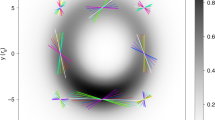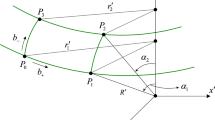Abstract
RECENTLY Harwit et al.1 established upper limits for any polarisation dependence in the bending of radio waves by the Sun's gravitational field. Any differential angular splitting between orthogonal polarisations was shown by VLBI techniques, and from the constancy of the Stokes parameters in the carrier wave from a spacecraft, to be < 10−3 and 10−6, respectively, of the total bending. Since the latter technique is not sensitive to a splitting in the tangential direction, whereas interferometry is, development of both methods is important. These experiments form a unique test of the equivalence principle1.
This is a preview of subscription content, access via your institution
Access options
Subscribe to this journal
Receive 51 print issues and online access
$199.00 per year
only $3.90 per issue
Buy this article
- Purchase on Springer Link
- Instant access to full article PDF
Prices may be subject to local taxes which are calculated during checkout
Similar content being viewed by others
References
Harwit, M., Lovelace, R., Dennison, B., Jauncey, D., and Broderick, J., Nature, 249, 230 (1974).
Fomalont, E., and Sramek, R., Astrophys. J., 199, 749 (1975).
Author information
Authors and Affiliations
Rights and permissions
About this article
Cite this article
DENNISON, B., DICKEY, J. & JAUNCEY, D. Improved upper limits of gravitational deflection of polarised radiation. Nature 263, 666–667 (1976). https://doi.org/10.1038/263666a0
Received:
Accepted:
Published:
Issue Date:
DOI: https://doi.org/10.1038/263666a0
This article is cited by
Comments
By submitting a comment you agree to abide by our Terms and Community Guidelines. If you find something abusive or that does not comply with our terms or guidelines please flag it as inappropriate.



